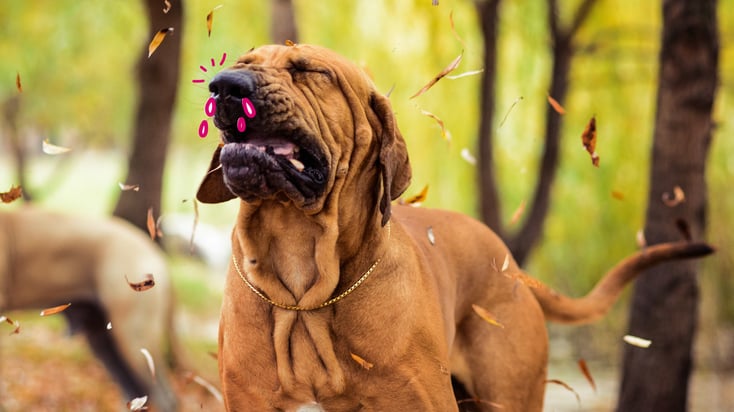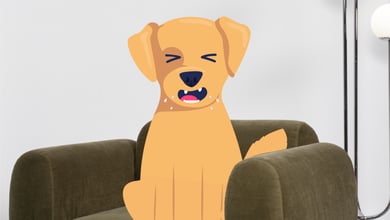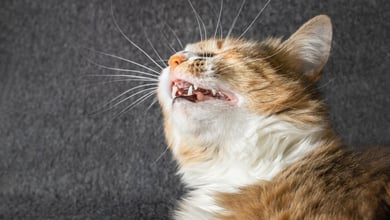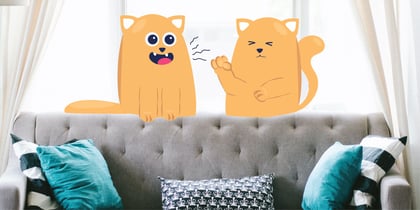Why is My Dog Sneezing So Much? 7 Possible Causes

Table of Contents
If you wonder why your dog keeps sneezing so much, you’ve come to the right place. There are a variety of reasons why your furry friend might be sneezing more than usual. Common causes of dog sneezing can be as simple as seasonal allergies, but they can also indicate more serious health problems.
Regardless of the cause, if your dog is sneezing a lot it’s best to have them evaluated by a qualified veterinarian.
Luckily, BetterVet's mobile veterinarians can help with allergy testing and treatment, and outline treatment plans for dogs with more complex issues.
Based on my practice as a veterinarian, these are the common causes of sneezing in dogs:
1. Communication
Dog sneezing doesn’t necessarily mean anything is wrong. Sometimes dogs can sneeze because they’re happy, excited, or in complete relaxation.
If your dog’s sneezing is accompanied by a wagging tail and excitable behavior, your pup’s sneezing may be their sign of playful communication.
Sometimes when dogs are really excited, they will do what’s called “reverse sneezing”, which sounds like snorting or a sharp inhale. Reverse sneezing is usually harmless, but if it persists for more than a few minutes or your pup seems uncomfortable, consult with your veterinarian to make sure that nothing is wrong.
2. Allergies
Dogs can suffer from allergies just like humans do. These can include allergies to specific environmental factors like dust or cleaning products causing nasal irritation. Dogs may also suffer from seasonal allergies such as pollen or mold allergies.
If your dog is sneezing a lot and also seems to have itchy skin, watery eyes, or a rash, there’s a good chance they are suffering from some type of allergy.
Allergies in dogs are fairly common and can be diagnosed by your veterinarian. If your pup is showing these symptoms, schedule a veterinary visit as soon as possible to diagnose your pet, get prompt treatment, and resolve their discomfort.
Does Your Pet Have Itchy Paws or Flaky Skin?
Our veterinarians can bring relief. Schedule a visit for allergy testing in the comfort of your home.
3. Foreign Objects
Dogs love to sniff around, and occasionally, they can inhale an object that can get stuck in their nasal passage.
Dogs may accidentally inhale things like grass, leaves, seeds, other plant materials, food particles, and even small objects.
Signs of a foreign object obstruction can include excessive sneezing accompanied by your pup pawing at their nose or rubbing it on the ground.
📒 Note: Do not attempt to remove the object yourself as you may risk harming your dog. If you suspect they have inhaled a foreign object, take them to the emergency veterinarian as soon as possible to identify where the object is lodged and have it removed.
4. Fungal Infections
If your dog is sneezing a lot and you also notice yellow discharge or bleeding coming from their nose, or they seem like they’re in pain or irritated, they may have developed a fungal infection. If your pup enjoys sniffing around in dirt they may be more prone to this type of infection.
5. Kennel Cough
Kennel cough is a common illness in dogs, and while it’s usually accompanied by coughing or other cold-like symptoms like a runny nose, sneezing can be also a standard symptom.
It’s a good idea to have your pup evaluated for kennel cough if they’re exhibiting several of these symptoms, as it is both contagious to other dogs and might spread to other pups you have, but most dogs respond well to treatment and will have a full recovery.
Hassle-free In-Home Pet Sick Visits
When your pet isn't feeling well, the last thing you want is a stressful trip to the vet. Our in-home sick pet visits offer a calm, stress-free alternative.
6. Dental Issues
Dental issues in dogs can often spread to the nasal passages. Tooth infections, abscesses, or other dental problems can easily cause sinus infections, which can cause sneezing, runny nose, and other sinus symptoms. Aside from discomfort caused by sneezing or stuffy nose, untreated dental problems can cause serious health complications for your pup.
Any suspected dental symptoms including foul-smelling breath, teeth that look rotten or damaged, or your dog showing signs of mouth discomfort can indicate that they’re suffering from a dental problem that’s causing their sneezing. These symptoms need to be addressed immediately with a veterinarian, as allowing infections to progress can have lasting consequences on your pet’s health.
By conducting a dental examination, your veterinarian can recommend a dental treatment plan that may include a dental clearing, treatment with antibiotics, or, in some cases, dental surgery.
7. Nasal Tumors
Nasal tumors in dogs are the most serious cause of excessive sneezing in dogs. If your dog develops a sneeze that doesn’t go away with time or gets progressively worse, they may be suffering from a growing tumor obstructing their airway. Other signs of a nasal tumor can include congestion, a runny nose, and nose bleeds.
If your pup is suffering from worsening upper respiratory symptoms, they may be dealing with a nasal tumor. If you suspect your pup may have a tumor, or you’re worried about excessive sneezing, schedule a consultation with a veterinarian immediately to determine a course of treatment.
How Can I Relieve Dog Sneezing
Many medications that are standard treatment for human sneezing can be extremely dangerous for pups, so don’t give them any medication without consulting a veterinarian first.
Scheduling an appointment with your veterinarian to rule out allergies or other health problems is the best way to ensure that your pup receives the treatment they need.
Proactively addressing dog sneezing as best as possible can also reduce symptoms in many dogs. Regular cleaning and vacuuming of bedding and common areas can help eliminate dust, pollen, or other irritants that might be making your dog’s symptoms worse.
When to Seek Guidance From a Vet
You should seek advice from a veterinarian if your dog’s sneezing continues for an extended period of time, seems excessive, or is accompanied by nasal discharge or congestion.
If their sneezing isn’t accompanied by social, excitable behavior, that indicates they are sneezing out of excitement, there may be another issue causing their symptoms.
While most causes of sneezing can be easily resolved, sneezing can also be a sign of health issues that may require immediate treatment. Your pup should be immediately evaluated to rule out allergies, nasal obstructions, or more serious health problems as soon as possible.
Some additional signs that should prompt a veterinary visit include sneezing accompanied by:
- Nose bleeds
- Discharge – clear or discolored
- Congestion
- Weakness
- Fever
- Coughing or trouble breathing
Conclusion
If your dog is sneezing excessively, it’s best to consult a veterinarian as soon as possible to rule out allergies or more serious health problems. Staying on top of your pup’s health will help you avoid exposing them to foods or environmental factors that are causing them irritation or making them uncomfortable.
Schedule a consultation with one of our qualified veterinarians for testing and a thorough health exam!
Virtual Vet Visits for Your Peace of Mind
Connect with an online vet from the comfort of your home. Convenient, affordable, and stress-free!
Frequently Asked Questions
What should I do if my dog keeps sneezing?
The best thing to do if your dog won’t stop sneezing is to schedule an appointment with a vet. We’ll be able to rule out any allergies, figure out what’s wrong, and provide you with treatment options.
Do dogs get over colds on their own?
Dogs with colds may get better on their own, but it’s still best to have them checked out by a veterinarian. If your dog’s sneezing hasn’t gotten better within a few days, or is getting worse, schedule a consultation as soon as possible to rule out more serious causes.
Do dogs know they are unwell?
Dogs know when they aren’t feeling well and communicate with us with their behavior. Even if your pup isn’t showing it, they still may be uncomfortable. Your veterinarian will help identify if your pup is uncomfortable and help them find relief.






